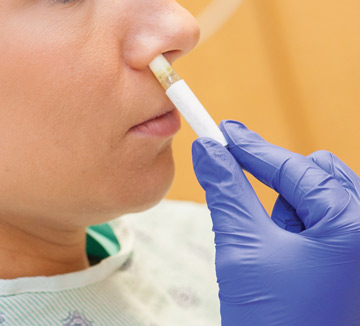If a standardized, comprehensive nasal decolonization regimen is a proven way to reduce the burden of infection-causing pathogens in the nares of patients, shouldn’t the practice be extended to surgical staff as well?
After all, masks aren’t 100% effective. If a provider is colonized with methicillin-resistant S. aureus (MRSA) in their nose, it’s possible for some of that bacteria to escape in respiratory aerosols, which could lead to contamination
of the sterile field or open incisions during a case. A growing body of research suggests practicing nasal hygiene on staff would reduce this risk.
A study in the American Journal of Infection Control (osmag.net/7akUYE) tested the effectiveness of using
a non-antibiotic, alcohol-based antiseptic to reduce the bacterial carriage in healthcare providers at an urban hospital. They treated all providers who tested positive for nasal Staphylococcus aureus (S. aureus) colonization
with either a topical antiseptic or a placebo three times per day. S. aureus and total bacterial colonization levels were then measured prior to and at the end of a 10-hour work shift. The study found that the application of the nasal antiseptic
was effective at reducing both S. aureus and total bacterial carriage.
There are a host of other potential benefits beyond reducing patient infections that are associated with staff treating their nares throughout the workday. For example, could the universal nasal decolonization of healthcare workers reduce their
risk of getting sick — particularly during flu season — and reduce absenteeism for a healthcare organization? These areas require further study, but in the meantime, we’re seeing the expansion of nasal antiseptics within
the healthcare community. It’s certainly a trend that perioperative leaders will want to watch closely.
—Sue Barnes, RN, BSN, CIC, FAPIC
.svg?sfvrsn=be606e78_3)

.svg?sfvrsn=56b2f850_5)